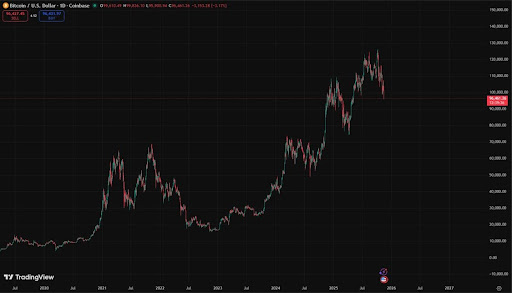Is Bitcoin Crashing Because Of A “Successful” DDOS Attack?

Recent reports suggest that Bitcoin is under a Distributed Denial-of-Service (DDoS) attack, forcing prices lower and transaction fees higher. The attack, observers note, is orchestrated through spam inscriptions that are clogging up the network, inconveniencing users.
Bitcoin Is Under Attack?
The so-called spam transactions via the Bitcoin Ordinals platform have prompted many to speculate that this is a DDoS attack.
In a DDoS attack, the malicious actors seek to overwhelm a network or server with traffic from multiple sources, rendering it inaccessible to users. In this case, the target was Bitcoin’s nodes tasked with confirming transactions.
Majority of tx's are currently just spamming the block space.
They're all 152.5vb in size transacting precisely 0.00000546 btc.
DDOS test? pic.twitter.com/l9yDTnkuL9
— Andrew (@dAnconiaMining) May 7, 2023
The memory pool, better known as mempool, stores unconfirmed but valid transactions waiting to be processed and remains clogged with transactions.
Analysis shows that the unconfirmed transactions currently exceed 466,000, comprising mostly assets from the Bitcoin Ordinals platform generated from UniSat.
UniSat is an open-source wallet and a Chrome extension that allows users to store and transfer Ordinals inscriptions and tokens compliant with the BRC-20 standard.
BRC-20 tokens are fungible tokens that are compatible with the Bitcoin network. The wallet had temporarily shut down following many double-spend attacks on the platform.
Due to some existing issues UniSat Marketplace is temporarily not available for accessing.
Sorry for the inconvenience. We'll keep you updated on this.
— UniSat Wallet – Store, Inscribe and Search. (@unisat_wallet) April 23, 2023
The marketplace reopened on April 27, 2023, coinciding with the increase in transaction fees and the surge of transactions on the Bitcoin network. As of May 6, the number of on-chain Bitcoin transactions was at record highs.
Signs Of What Lies Ahead?
There are concerns among analysts that the recent surge in transactions, which resembles a prolonged DDoS attack, could indicate a potential coordinated sabotage by malicious entities. According to the analysts, these actors could be aiming to cause instability and unreliability in the Bitcoin network.
In response to the flood of transactions from the Ordinals platform, on-chain transaction fees on Bitcoin have risen as the network congests.
Bitcoin is under DoS attack. High transaction fees are the chosen pain point by the attacker, probably to makes bitcoin unusable for smaller players. pic.twitter.com/0J56liNSGf
— iris.to/jogi (@proofofjogi) May 7, 2023
Meanwhile, prices are lower, approaching the $27,000 mark. This level is a critical support level flashing with April 2023 lows.
As BTC’s price continues to fall, investors and traders are increasingly concerned about the overall state of the cryptocurrency market, which is already experiencing significant volatility, with many tokens posting double-digit losses.
PEPE, the meme token, is down 33% on the last trading day. While some believe the DDoS attack may be a temporary setback, which would end once the perpetrators run out of BTC, others are worried that it could be a sign of a larger trend of increased cyberattacks on the blockchain.
BRC-20 token creations.
Shitcoins on #bitcoin is here.
Everything is good for bitcoin. We knew high transactions fees were coming, but now we need to figure out a way to navigate this.
Good thing is they will eventually run out of bitcoin by doing this.
— Chris Alaimo (@ChrisAlaimo6) May 6, 2023


